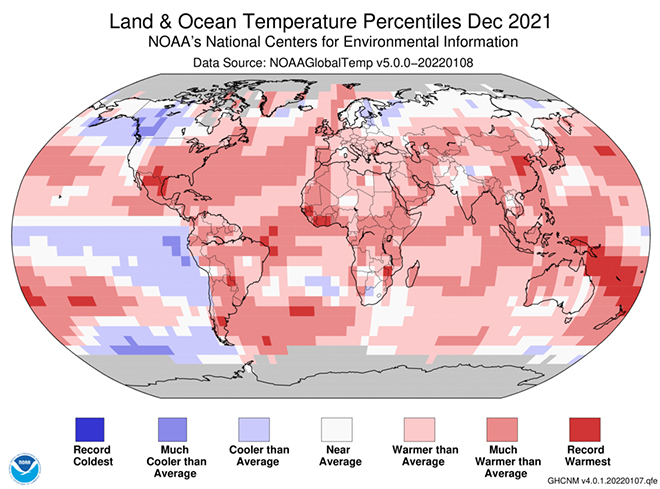Featured Topics
Featured Products
Events
S&P Global Offerings
Featured Topics
Featured Products
Events
S&P Global Offerings
Featured Topics
Featured Products
Events
S&P Global Offerings
Featured Topics
Featured Products
Events
Financial and Market intelligence
Fundamental & Alternative Datasets
Government & Defense
Professional Services
Banking & Capital Markets
Economy & Finance
Energy Transition & Sustainability
Technology & Innovation
Podcasts & Newsletters
Financial and Market intelligence
Fundamental & Alternative Datasets
Government & Defense
Professional Services
Banking & Capital Markets
Economy & Finance
Energy Transition & Sustainability
Technology & Innovation
Podcasts & Newsletters
13 Jan, 2022
By Karin Rives
With ocean heat rising to record levels and large swaths of the world registering their highest temperatures so far, 2021 ranked as the sixth-warmest year globally since record-keeping began 142 years ago, U.S. scientists said.
NASA and the National Oceanic Atmospheric Administration on Jan. 13 released their annual assessments of the world's climate, predicting that ever-increasing concentrations of heat-trapping gases in the atmosphere will likely deliver another scorcher with the potential for more extreme weather in 2022.
Concentrations of carbon dioxide in the atmosphere reached an all-time high of 419 parts per million, NOAA reported in June 2021. Energy production and consumption accounts for about 75% of global greenhouse gas emissions, according to the International Energy Agency.
At the current rate, the world has a 50-50 chance of crossing this decade the threshold of 1.5 degrees C warming from pre-industrial levels, Russell Vose, chief of climate monitoring for NOAA's National Centers for Environmental Information, told reporters during a briefing to discuss the data.
Scientists say the world must keep the temperature rise to 1.5 degrees to avoid the worse impacts of climate change. However, Vose said average global temperatures are expected to climb past 1.5 degrees by the early 2040s. Many nations at the end of the latest United Nations climate change conference held in early November 2021 pledged to try to slow the warming trend and meet the most ambitious goal of the Paris Agreement on climate change.

Vose ran through a litany of weather disasters that occurred in the U.S. over the last year, noting that a day earlier his agency reported that such events resulted in $145 billion in losses and more than 680 lives lost.
"Unfortunately, we certainly expect to see more of the extremes in a warming world," Vose said. "Some of these events were probably not even possible without global warming, or at least they were made worse by it."
The NOAA and NASA analysis reported that the average global temperature during 2021 was 0.84 degrees above 20th-century averages in 2021, making it the 45th year since 1977 to exceed last century's warming levels. The La Niña weather pattern in the eastern Pacific was able to "slightly" cool global temperatures even as the heat stored in the ocean's upper levels reached record temperatures in 2021, the analysis added.
The oceans have absorbed more than 90% of the heat trapped in Earth's system, which in turn contributes to rising sea levels since warmer water expands, along with melting glaciers and ecosystem changes, according to NOAA.
While the loss of Arctic sea ice did not reach record levels in 2021 the trends are clear, said Gavin Schmidt, director for NASA Goddard Institute for Space Studies. Arctic temperatures are rising more than twice as fast as the global average, which will ultimately affect the rest of the world, Schmidt said.
"The permafrost, which is releasing carbon dioxide and methane into the atmosphere is amplifying feedback on climate change and potential impacts in the mid-latitudes," Schmidt said. "What happens in the Arctic doesn't stay in the Arctic and the changes are really quite dramatic."